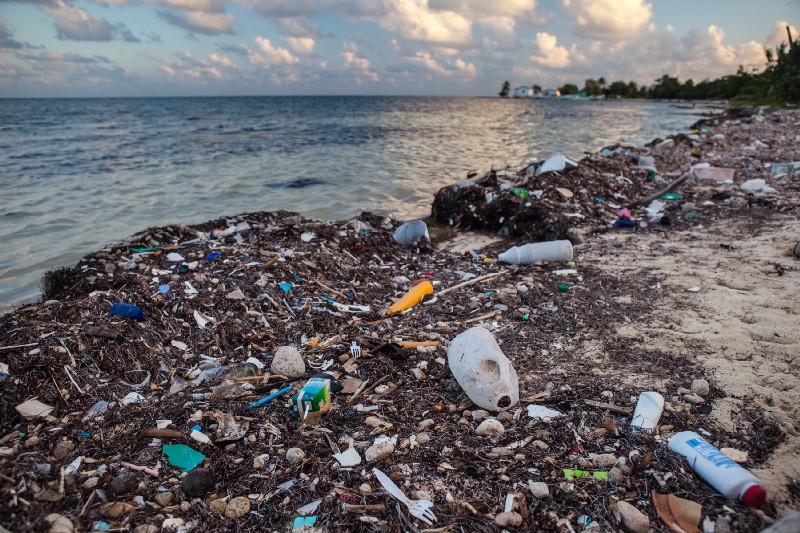200 Countries Call For End to Plastic Pollution
Serious measures to tackle the ocean plastic waste crisis got a strong boost this week as 200 nations at a United Nations Environment Assembly in Nairobi pledged to eliminate plastic pollution in the world’s oceans. It’s largely a symbolic assertion for now, elevating the prominence of the issue, but it’s a major starting point toward a binding treaty.
Erik Solheim, UN environment head and UN undersecretary-general, called the issue of ocean plastic “an ocean Armageddon,” and summarized the challenge ahead by stating that “we need to phase out what we don’t need, make what we do need with better materials, and recycle all the plastics that we use.”
Plastic pollution on land and water has risen in prominence dramatically as an environmental issue in the last two years as new science-based studies showed far higher rates of plastic ending up in oceans than previously believed, and institution issued blueprints for stemming that flow.
The Basic Facts:
8 million tons of plastics are dumped in oceans annually, equivalent to a garbage truck every minute. At this rate, oceans will contain more plastic than fish by weight by 2050.
Plastics break down in water into small indigestible particles that birds and marine mammals mistake for food, resulting in illness and death.
Plastics particles absorb toxics like dioxins, pesticides, and metals from water, transferring them to the marine food web and potentially to human diets.
As You Sow’s shareholder engagement leadership work on plastic pollution focuses on packaging as it is the biggest single market for plastics, comprising 26% of total plastic production volume, and the source of many wasteful single use applications. Nine of the 10 most frequently found waste items on beach cleanups are packaging or related food service ware or condiments.
The first step towards a solution is to make packaging recyclable. For four years, we have challenged several large consumer brands to make their packaging more recyclable. Three industry giants — Colgate-Palmolive, Procter & Gamble and Unilever — responded with a public commitment.
We are also making a special effort to press for phasing out polystyrene foam beverage cups and take-out packaging. Foam may pose a higher risk to marine animals than other plastics due to its hazardous constituent chemicals, and research shows it can accumulate high concentrations of water borne toxins in a short time frame. Ten countries and more than 100 U.S. cities or counties have banned or restricted foam packaging. In 2013, we had a great victory when McDonald’s Corp. phased out the use of polystyrene foam hot cups in the U.S. after our proposal received a strong shareholder vote. However, foam is still used by McDonald’s for cold beverages in some areas of the U.S., and for hot beverages in rapidly developing Asian countries including China and the Philippines where plastic deposition is very high. As a result, we have asked McDonald’s to phase out foam globally, and our proposal received the support of 32% of shares voted earlier this year.
For 2018, we are challenging Starbucks to phase out the use of plastic straws, widely known to cause harm to marine animals, as discussed in this recent blog post.
The ocean plastics crisis has also been propelled forward as an issue by the following leadership actions:
· The New Plastics Economy project developed by the Ellen MacArthur Foundation seeks a global protocol to reduce the use of hundreds of polymers and resins to far fewer ones that are most recyclable and least toxic. The leaders of 15 major companies recommended phasing out polystyrene for packaging purposes in an NPE report released in January.
· The Ocean Conservancy has issued well-researched reports dealing with the scope of the problem and potential solutions, and assessing priority investment strategies to improve waste management in countries identified as having the greatest deposition of plastic. There has been some deserved pushback by NGOs in regards to OC’s suggested use of incineration and waste to energy, but in general its research and recommendations have been valuable and advanced the issue. OC also convened the Trash Free Seas Alliance, a mostly corporate group working on the issue.
· Hundreds of NGOs globally have organized loosely under the umbrella of the #BreakFreeFromPlastic campaign and are beginning to make their presence felt. A massive brand audit sorting plastic trash pulled from Manila Bay in September identified Nestle, P&G, and Unilever brands as the most prominently found waste packaging. Greenpeace UK publicized the volume of plastic used by Coca-Cola, leading the company to reverse its long-held opposition to bottle deposit laws and endorsing them for Scotland.
The UN Assembly’s call by 200 nations for an end to ocean plastic pollution demonstrates how crucial it is that coordinated work be done on a global level. Consumer goods companies like Coca-Cola, P&G, and Unilever that operate in more than 100 countries will be pressed to be actively involved in improving waste collection, recycling and composting systems in all areas where they operate. This is a mammoth, unprecedented task likely requiring mandates like a global treaty to develop a level playing field where all companies placing packaging into commerce pay their fair share to ensure it is collected and recycled. Plastics that cannot be efficiently recycled at high levels are phased out and replaced with materials more conducive to a circular economy. There is good reason to hope that the UN Assembly can keep momentum toward a binding agreement.
Vidar Helgesen, Norway’s environmental minister, said we “now have an agreement to explore a legally binding instrument and other measures and that will be done at the international level over the next 18 months.” In the meantime, we will keep pushing corporations to do a better job of self-governance on plastics use.
We look forward to continuing to educate and engage shareholders and corporate management on the scope of the plastic pollution problem, and to receiving more substantive corporate commitments to form part of the solution.

